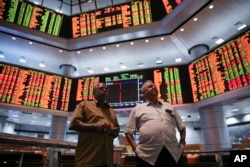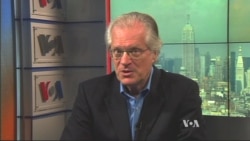China cut interest rates a quarter of a percentage point Tuesday, to 4.6 percent, and eased bank reserve requirements, effectively pumping more money into the system to stimulate its weakening economy. But while the move helped stabilize markets in Europe and, for a time, the U.S., it wasn’t enough to halt the slide in Asia.
Kevin O’Leary at Boston-based investment manager O’Shares Investments said that’s because the outlook for China’s growth remains murky.
"Instead of thinking of China growing at 8 percent, we think, it's going to grow 5 or 6 percent," he said. "That's 20 percent less growth than anticipated. “
That’s led some investors to avoid the uncertainty in Chinese equities and focus instead on looking for value in discounted stocks.
Eric Wiegand, a senior portfolio manager at US Bank, said that "for U.S. investors, we find that this is creating opportunities. We still believe that as far as domestic equities are concerned, there is a great deal of attractiveness to shares.”
But unless China finds its footing, any recovery in U.S. and European markets is bound to be short-lived.
Economist Nicholas Lardy of the Peterson Institute for International Economics in Washington, one of the leading experts on China’s economy, said, "I think the main reason China matters so much is it’s the second-biggest economy in the world. It’s the second-largest trading economy, so if China’s economic performance is going to suffer, the rest of the world is going to pay a price.”
For financial markets around the world, the price has been increased volatility. That was evident Tuesday on Wall Street, when stocks rose as much as 3½ percent in early trading, only to plunge back into negative territory in time for the closing bell. The Dow Jones industrial average was off 1.3 percent at the close of trading.
Better news in Europe
Investors in Europe, though, were reassured, with stocks rising 3 percent in London, 4 percent in Paris and 5 percent in Germany.
Earlier Tuesday, China's Shanghai index was down more than 7 percent, while Tokyo was down nearly 4 percent. Hong Kong's Hang Seng rallied in the final hour to finish just ahead in positive territory.
Chinese officials acted after several days of plunging stock prices around the world as investors worried that Chinese economic growth was slowing.
The nervousness had pushed down global stock and oil prices Monday, including an 8 percent stock market plunge in China.
Monday's slump included U.S. markets, which experienced a volatile day of trading before finishing down at least 3.6 percent.
Market correction
Experts said U.S. stock markets were due for a major correction after nearly tripling since 2009. Joshua Brockwell of Azzad Asset Management said such self-correcting mechanisms ensures stocks are fairly priced.
"If you think of it as a kind of tremor instead of a great earthquake, the ground is kind of letting off a little steam," Brockwell said. "The market's kind of letting off a little steam right now, which is actually a healthy thing for stocks [in the] longer term."
“Now that we have seen this retrenchment over the past couple of days, equities or stocks have gotten back to a fairer valuation, and are actually cheaper, so it could be an opportunity for a longer-term investor to buy,” he said.
China's growing economy has been a major market for commodities and all kinds of goods for many years. But a series of economic shocks have made investors question the health and growth of the world's second-largest economy.
Notable Market Drops
- Black Monday — October 19, 1987 — The Dow Jones Industrial Average fell 22.61%.
- Early 1990s recession — Iraq invaded Kuwait in July 1990, causing oil prices to spike; Dow dropped 18% in three months
- 9/11 Attacks Economic Effects — Global stock markets tank
- Stock Market Downturn — October 9, 2002 — Stocks tumble in U.S., Canada, Asia, and Europe.
- Chinese Stock Bubble — February 27, 2007 — The SSE Composite Index of the Shanghai Stock Exchange plummets 9% after unexpected selloffs.
- U.S. Bear Market of 2007-2009 — Until June 2009, U.S. exchanges had declines of greater than 20% from peaks in late 2007.
- Financial Crisis of 2008 — September 16, 2008 — Failures of large U.S. financial institutions turned into global crisis resulting in a number of bank failures in Europe and major drops stock prices.
- 2010 Flash Crash — May 6, 2010 — Dow suffers its worst intra-day point loss, dropping nearly 1,000 points before partially recovering.
- August 2011 Stock Markets Fall — August 1, 2011 — Global stock markets plummet during late July, early August, and are volatile for the rest of the year.
- 2015 Chinese Stock Market Crash — June , 2015 — Chinese stocks fall to eight month lows.
Chinese stock markets doubled in value over the 12 months ending in mid-June, but the central bank put a halt to that rapid rise when it devalued the yuan currency on August 11. Bank officials called it a free-market reform, but many economists and markets around the world saw it as the start of a long-term yuan depreciation to spur exports.
An economic report showing weak manufacturing data last Friday triggered a massive slide in Chinese stock prices, and that was followed by the Shanghai market's biggest losses in eight years on Monday. The rest of the world's markets saw those signs of slower Chinese growth as an indicator of a global business decline, and that ignited Monday's widespread market collapse.
Drop downplayed in China
Chinese state media made little mention of the volatility in the market on Tuesday, with state television spending a large part of the day focused on preparations for a massive military parade in Beijing next week to mark the 70th anniversary of the end of World War II. On major websites, news of the market’s continued turmoil was present, but conspicuously lower on the page.
Overseas, some sought to cool concerns about the fluctuations in China’s market and the possible impact on is broader economy and consumer sentiment.
Australia’s Prime Minister Tony Abbott argued there is no need to "hyperventilate" about China's market turmoil. From time to time, he said, stock market corrections and the bursting of bubbles can spill over into other markets.
In New York, S&P Capital IQ's Sam Stovall said China's growth probably would fall to 6.6 percent next year, which is dramatically slower than in the past. But in a VOA interview, Stovall said that rate of expansion was still an "enviable" one.
In a rare comment midway through a financial quarter, Apple Chief Executive Tim Cook talked about his company's business.
In an emailed response to questions from The Wall Street Journal about an increase in iPhone activations over the past few weeks, Cook wrote that while he obviously could not predict the future, performance so far this quarter looked reassuring. He also voiced his belief that China represented an unprecedented opportunity over the long term.
William Ide contributed to this report from Beijing; Jim Randle and Ken Bredemeier contributed from Washington.
Analysis from VOA's New York bureau:










